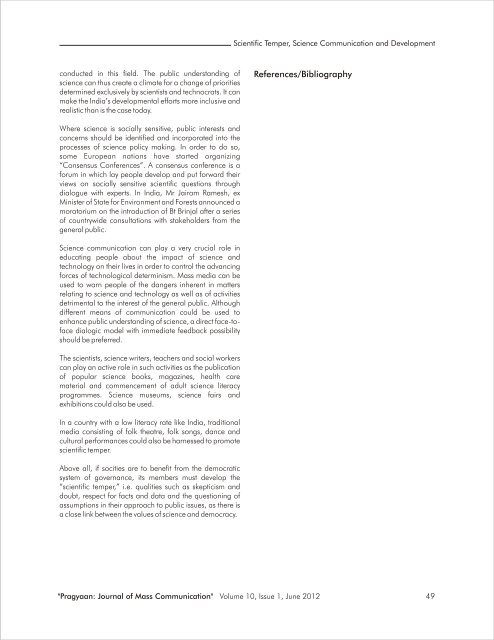Research Papers/Articles - Institute of Management Studies Dehradun
Research Papers/Articles - Institute of Management Studies Dehradun
Research Papers/Articles - Institute of Management Studies Dehradun
You also want an ePaper? Increase the reach of your titles
YUMPU automatically turns print PDFs into web optimized ePapers that Google loves.
conducted in this field. The public understanding <strong>of</strong><br />
science can thus create a climate for a change <strong>of</strong> priorities<br />
determined exclusively by scientists and technocrats. It can<br />
make the India’s developmental efforts more inclusive and<br />
realistic than is the case today.<br />
Where science is socially sensitive, public interests and<br />
concerns should be identified and incorporated into the<br />
processes <strong>of</strong> science policy making. In order to do so,<br />
some European nations have started organizing<br />
“Consensus Conferences”. A consensus conference is a<br />
forum in which lay people develop and put forward their<br />
views on socially sensitive scientific questions through<br />
dialogue with experts. In India, Mr Jairam Ramesh, ex<br />
Minister <strong>of</strong> State for Environment and Forests announced a<br />
moratorium on the introduction <strong>of</strong> Bt Brinjal after a series<br />
<strong>of</strong> countrywide consultations with stakeholders from the<br />
general public.<br />
Science communication can play a very crucial role in<br />
educating people about the impact <strong>of</strong> science and<br />
technology on their lives in order to control the advancing<br />
forces <strong>of</strong> technological determinism. Mass media can be<br />
used to warn people <strong>of</strong> the dangers inherent in matters<br />
relating to science and technology as well as <strong>of</strong> activities<br />
detrimental to the interest <strong>of</strong> the general public. Although<br />
different means <strong>of</strong> communication could be used to<br />
enhance public understanding <strong>of</strong> science, a direct face-t<strong>of</strong>ace<br />
dialogic model with immediate feedback possibility<br />
should be preferred.<br />
The scientists, science writers, teachers and social workers<br />
can play an active role in such activities as the publication<br />
<strong>of</strong> popular science books, magazines, health care<br />
material and commencement <strong>of</strong> adult science literacy<br />
programmes. Science museums, science fairs and<br />
exhibitions could also be used.<br />
In a country with a low literacy rate like India, traditional<br />
media consisting <strong>of</strong> folk theatre, folk songs, dance and<br />
cultural performances could also be harnessed to promote<br />
scientific temper.<br />
Above all, if socities are to benefit from the democratic<br />
system <strong>of</strong> governance, its members must develop the<br />
“scientific temper,” i.e. qualities such as skepticism and<br />
doubt, respect for facts and data and the questioning <strong>of</strong><br />
assumptions in their approach to public issues, as there is<br />
a close link between the values <strong>of</strong> science and democracy.<br />
Scientific Temper, Science Communication and Development<br />
References/Bibliography<br />
"Pragyaan: Journal <strong>of</strong> Mass Communication" Volume 10, Issue 1, June 2012 49


